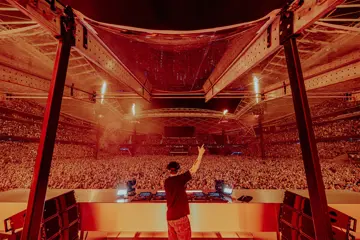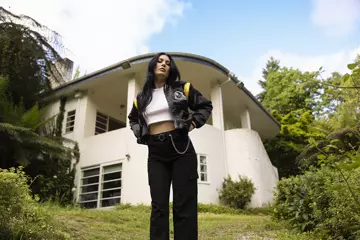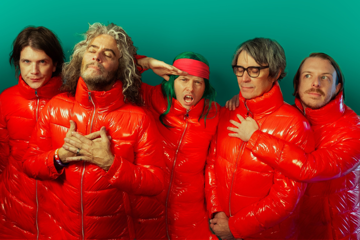Brave New World Order runs from tonight until Saturday at the Visy Theatre, Brisbane Powerhouse.
There’s no denying the post September 11 world exists in a vastly different political climate that any time before. Skip forward three years, and you’ll find global security being handed by a single multinational company, Globalcorp. Such is the premise behind a new satirical rock operatic comedy Brave New World Order. While the focus of Brave New World Order is globalisation and it’s effects, last year’s terrorist attacks took the production into a new dimension. Writer Brett Heath explains the project he developed along with musical collaborator Clarry Evans.
“Clarry has been interested in writing an anti globalisation piece for some time. There was an SBS documentary about the World Trade Organisation riots in Seattle in 1999, which was made by an underground documentary team. He showed it to me, and it was really interested in terms of the number of people ranged against the WTO. Prior to that I kind of held the view that globalisation was just an economic consequence of the way the world is now, and there was no point debating if it was a good or bad thing, because it was just the way it was. But after seeing the arguments advanced by the speakers at the rally in ’99 turned me on to looking critically at the issue of globalisation.”
“After S11, the view that I had was who really cares about globalisation now while other things in the world are far more ominous. What happened was interesting and it’s worked it’s way into the play, and it’s a key point in the piece. After September, people were so scared they were willing to underwrite any actions to keep the world safe. While people are s anxious, governments and corporations will take advantage of people to turn it into profit. So the leap we took was that the government’s will factor out their responsibility for security to a company. Because the company is driven by profit and makes weapons themselves, they’ve got a vested interest in maintaining the world in a state of threat, so they do a deal with the terrorists.”
“We were really interested in the political side of globalisation; why are government’s are so weak, why they are in bed with corporations and why do corporations dictate policy and where is this all going to lead us. But we couldn’t find a story to hang it all together on, because the last thing we wanted to do was write a political diatribe or a pamphlet, it’s not what making theatre is all about.”
Considering Heath’s background in Shakespearean theatre, the obvious choice was made for Brave New World Order’s plot structure.
Don't miss a beat with our FREE daily newsletter
“We really struggled for about a year to find a way into this story. The key was to find an old, well-known plot, so the whole thing is hung on the plot of Hamlet. Instead of something being rotten in the state of Denmark, something is rotten in the state of Globalcorp.”
“Globalcorp is a multinational company, an amalgam of all the multinationals, and it’s set three years into the future in 2005. It’s created a corporate estate that regulates the world. The CEO of Globalcorp has gone missing in mysterious circumstances, like Hamlet’s father. We’ve got Hamlet, his son, the spoilt little rich boy who thinks he’s going to take over the big chair. But of course, he’s gazumped by his mum and the little brother who gets there first. Within the organization we’ve got Ophellia, who’s the anti globalisation activist, who’s trying to bring the company down.”
Because of the relative familiarity of Shakespeare to a modern audience, the use of his plot and characters allows the audience to better relate to the situations, rather than concentrate on the storyline.
“We’re trying to fit some big themes in a way that people are going to recognise. Most people would know generally the story of Hamlet, so it was a way into these big themes. We went through various dry gullies before hand. The worst idea we had was to write a musical about writing a musical. We figured a good way to deal with these themes would be to have a lot of people in a room talking about these themes. I often find if you want to delve into something complex like the globalisation debate, it’s good to have something fairly simple to hang things on.”
“We wanted to look at just how powerful corporations really are. They are certainly more powerful than they were twenty years ago, so we wanted to look at where it could go if companies continue to regulate themselves without any government intervention and take it to a possible ending. It’s a handy way of raising some serious issues. You’d be naïve to think corporations are motivated by anything other than profit.”
















